表,主语从句总结
英语从句类型总结
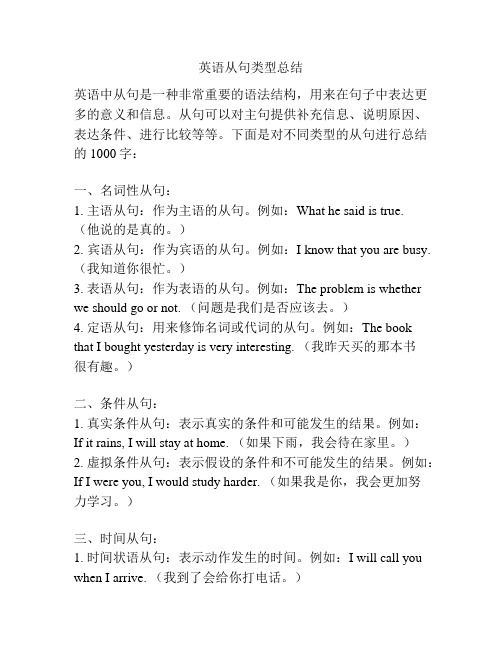
英语从句类型总结英语中从句是一种非常重要的语法结构,用来在句子中表达更多的意义和信息。
从句可以对主句提供补充信息、说明原因、表达条件、进行比较等等。
下面是对不同类型的从句进行总结的1000字:一、名词性从句:1. 主语从句:作为主语的从句。
例如:What he said is true.(他说的是真的。
)2. 宾语从句:作为宾语的从句。
例如:I know that you are busy. (我知道你很忙。
)3. 表语从句:作为表语的从句。
例如:The problem is whether we should go or not. (问题是我们是否应该去。
)4. 定语从句:用来修饰名词或代词的从句。
例如:The book that I bought yesterday is very interesting. (我昨天买的那本书很有趣。
)二、条件从句:1. 真实条件从句:表示真实的条件和可能发生的结果。
例如:If it rains, I will stay at home. (如果下雨,我会待在家里。
)2. 虚拟条件从句:表示假设的条件和不可能发生的结果。
例如:If I were you, I would study harder. (如果我是你,我会更加努力学习。
)三、时间从句:1. 时间状语从句:表示动作发生的时间。
例如:I will call you when I arrive. (我到了会给你打电话。
)2. 状语从句:表示伴随动作的时间。
例如:He is reading while waiting for the bus. (他在等车的时候看书。
)四、原因从句:1. 原因状语从句:表示动作的原因。
例如:I'm tired because I didn't sleep well last night. (我昨晚睡得不好,所以很累。
)2. 结果状语从句:表示动作的结果。
例如:He ran so fast thathe won the race. (他跑得太快,所以赢得了比赛。
高中英语语法归纳总结从句

高中英语语法归纳总结从句从句是英语语法中的一个重要部分。
它能够在句子中充当名词、形容词或副词的作用,增强句子的表达力和多样性。
本文将对高中英语语法中的从句进行归纳总结,帮助学生们更好地理解和应用从句。
一、名词性从句名词性从句可以在句中担任主语、宾语、表语和同位语的角色。
常见的名词性从句有以下几种类型。
1. 主语从句主语从句在句中充当主语的角色,常以“that”或“whether/if”引导。
例如:“What you said doesn't make sense.”(你说的话毫无意义。
)主语从句的引导词可以省略,直接使用动词来引导,例如:“To forgive is to forget.”(宽恕就是忘记。
)2. 宾语从句宾语从句在句中作为动词的宾语,常以“that”或连接词引导,例如:“He said that he would come.”(他说他会来。
)宾语从句的引导词可以根据从句的内容来选择,如“whether/if”、“when”、“where”等。
3. 表语从句表语从句在句中充当表语的角色,常以“that”引导,例如:“The fact is that he is ly ing.”(事实是他在说谎。
)4. 同位语从句同位语从句用来解释或说明名词的具体内容,常以“that”引导,例如:“The news that he won the prize surprised everyone.”(他获奖的消息让每个人都感到惊讶。
)二、形容词从句形容词从句用来修饰名词,常以“that”或“which”引导。
形容词从句通常紧跟在被修饰的名词之后。
例如:“The book that he recommendedis very interesting.”(他推荐的那本书非常有趣。
)三、副词从句副词从句可以修饰动词、形容词或副词,并且可以表示时间、地点、原因、方式、条件等。
常见的引导词有以下几种。
英语三大从句类型总结
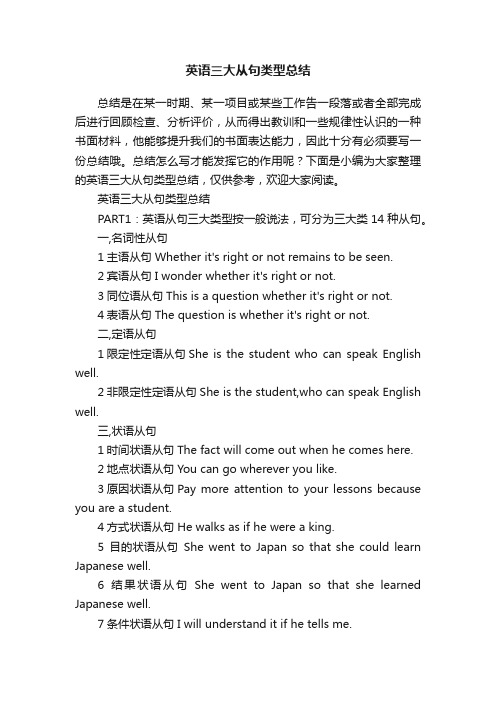
英语三大从句类型总结总结是在某一时期、某一项目或某些工作告一段落或者全部完成后进行回顾检查、分析评价,从而得出教训和一些规律性认识的一种书面材料,他能够提升我们的书面表达能力,因此十分有必须要写一份总结哦。
总结怎么写才能发挥它的作用呢?下面是小编为大家整理的英语三大从句类型总结,仅供参考,欢迎大家阅读。
英语三大从句类型总结PART1:英语从句三大类型按一般说法,可分为三大类14种从句。
一,名词性从句1主语从句Whether it's right or not remains to be seen.2宾语从句I wonder whether it's right or not.3同位语从句This is a question whether it's right or not.4表语从句The question is whether it's right or not.二,定语从句1限定性定语从句She is the student who can speak English well.2非限定性定语从句She is the student,who can speak English well.三,状语从句1时间状语从句The fact will come out when he comes here.2地点状语从句You can go wherever you like.3原因状语从句Pay more attention to your lessons because you are a student.4方式状语从句He walks as if he were a king.5目的状语从句She went to Japan so that she could learn Japanese well.6结果状语从句She went to Japan so that she learned Japanese well.7条件状语从句I will understand it if he tells me.8让步状语从句He knows a lot though he is little.PART2:经典名词性从句主语从句(subject clauses)在复合句中起主语作用的从句叫主语从句。
从句语法知识点总结

从句语法知识点总结一、名词性从句名词性从句是在主句中充当名词的从句,通常包括主语从句、宾语从句、表语从句和同位语从句。
1. 主语从句主语从句在复合句中充当主语,常常以“it is/was + that/whether/if + 从句”或“wh-词 + 谓语”引导,如:- It is important that we finish the project on time.(是否我们能按时完成项目很重要。
)- Whether we go hiking depends on the weather.(我们是否去徒步取决于天气。
)2. 宾语从句宾语从句在复合句中充当宾语,常常以“that/whether/if + 从句”或“wh-词 + 谓语”引导,如:- She told me that she would come to the party.(她告诉我她会来参加派对。
)- I wonder if he has finished his homework.(我想知道他是否做完了作业。
)3. 表语从句表语从句在复合句中充当表语,常常以“that/whether/if + 从句”或“wh-词 + 谓语”引导,如:- The problem is that we are running out of time.(问题是我们时间不够了。
)- His belief is that hard work leads to success.(他的信念是努力工作会导致成功。
)4. 同位语从句同位语从句在句中对前面的名词起补充说明或解释的作用,常常以“that/wh-词 + 谓语”引导,如:- The news that the team won the championship made everyone excited.(球队赢得冠军的消息让每个人都很兴奋。
)- I have no idea where they are going for vacation.(我不知道他们去哪里度假。
初中重要知识点归纳从句的种类与用法总结
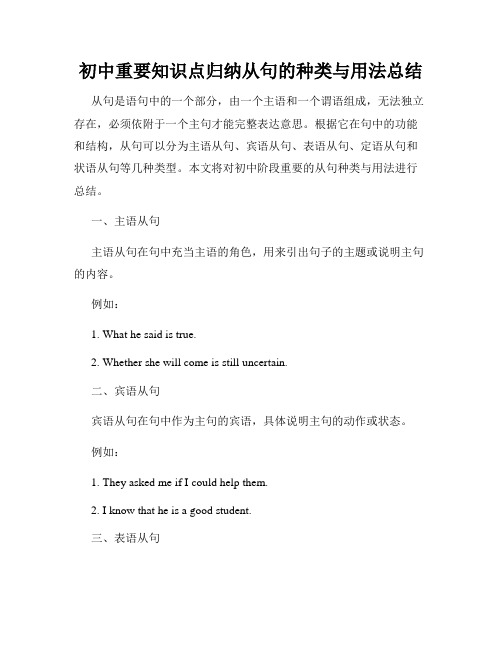
初中重要知识点归纳从句的种类与用法总结从句是语句中的一个部分,由一个主语和一个谓语组成,无法独立存在,必须依附于一个主句才能完整表达意思。
根据它在句中的功能和结构,从句可以分为主语从句、宾语从句、表语从句、定语从句和状语从句等几种类型。
本文将对初中阶段重要的从句种类与用法进行总结。
一、主语从句主语从句在句中充当主语的角色,用来引出句子的主题或说明主句的内容。
例如:1. What he said is true.2. Whether she will come is still uncertain.二、宾语从句宾语从句在句中作为主句的宾语,具体说明主句的动作或状态。
例如:1. They asked me if I could help them.2. I know that he is a good student.三、表语从句表语从句在句中作为主语或宾语的补充,用来补充说明主语或宾语的特点、性质、状态等。
例如:1. The problem is whether we can solve it.2. His dream is to become a doctor.四、定语从句定语从句在句中作为主句中的名词的修饰语,用来对主句中的名词进行限定或修饰。
例如:1. The book that you lent me is very interesting.2. I like the girl whose hair is long and curly.五、状语从句状语从句在句中作为主句的一个状语成分,用来说明主句的时间、原因、目的、条件、方式等情况。
例如:1. I will go to the park if it doesn't rain tomorrow.2. Because I was sick, I couldn't attend the party.需要注意的是,从句的引导词会根据从句的类型和引导的具体内容而有所不同。
中的表语从句与主语从句的区别与联系总结
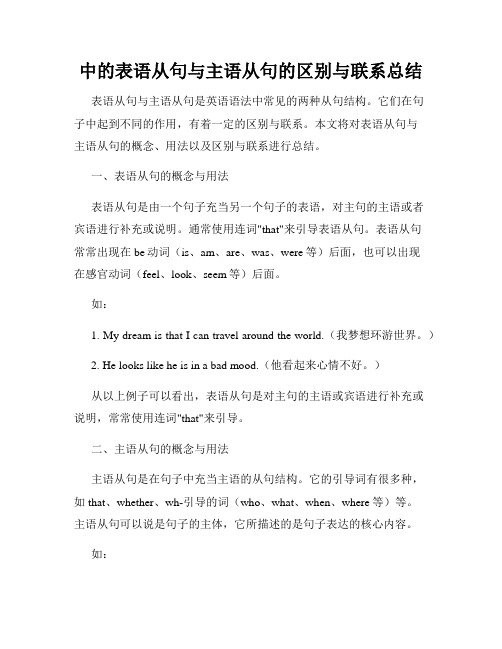
中的表语从句与主语从句的区别与联系总结表语从句与主语从句是英语语法中常见的两种从句结构。
它们在句子中起到不同的作用,有着一定的区别与联系。
本文将对表语从句与主语从句的概念、用法以及区别与联系进行总结。
一、表语从句的概念与用法表语从句是由一个句子充当另一个句子的表语,对主句的主语或者宾语进行补充或说明。
通常使用连词"that"来引导表语从句。
表语从句常常出现在be动词(is、am、are、was、were等)后面,也可以出现在感官动词(feel、look、seem等)后面。
如:1. My dream is that I can travel around the world.(我梦想环游世界。
)2. He looks like he is in a bad mood.(他看起来心情不好。
)从以上例子可以看出,表语从句是对主句的主语或宾语进行补充或说明,常常使用连词"that"来引导。
二、主语从句的概念与用法主语从句是在句子中充当主语的从句结构。
它的引导词有很多种,如that、whether、wh-引导的词(who、what、when、where等)等。
主语从句可以说是句子的主体,它所描述的是句子表达的核心内容。
如:1. That he won the championship surprised everyone.(他赢得冠军让大家惊讶。
)2. Whether we can go camping is dependent on the weather.(我们能否去野营取决于天气。
)从以上例子可以看出,主语从句在句子中充当主语的角色,描述的是句子的核心内容,常常使用引导词that、whether、wh-引导的词等。
三、表语从句与主语从句的区别1. 结构不同:表语从句常常使用连词"that"来引导,而主语从句的引导词有多种变化。
2. 位置不同:表语从句通常出现在be动词后面,充当be动词的补足语;而主语从句作为整个句子的主体,位于句首位置。
中的表语从句与主语从句总结
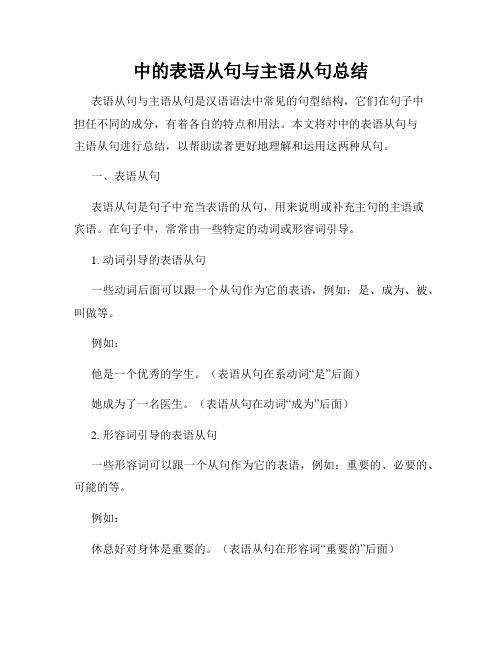
中的表语从句与主语从句总结表语从句与主语从句是汉语语法中常见的句型结构,它们在句子中担任不同的成分,有着各自的特点和用法。
本文将对中的表语从句与主语从句进行总结,以帮助读者更好地理解和运用这两种从句。
一、表语从句表语从句是句子中充当表语的从句,用来说明或补充主句的主语或宾语。
在句子中,常常由一些特定的动词或形容词引导。
1. 动词引导的表语从句一些动词后面可以跟一个从句作为它的表语,例如:是、成为、被、叫做等。
例如:他是一个优秀的学生。
(表语从句在系动词“是”后面)她成为了一名医生。
(表语从句在动词“成为”后面)2. 形容词引导的表语从句一些形容词可以跟一个从句作为它的表语,例如:重要的、必要的、可能的等。
例如:休息好对身体是重要的。
(表语从句在形容词“重要的”后面)帮助别人是值得提倡的行为。
(表语从句在形容词“值得提倡的”后面)二、主语从句主语从句是句子中充当主语的从句,用来说明或描述主句的主语。
在句子中,常常由一些特定的词引导。
1. 连词引导的主语从句一些连词可以引导一个从句作为主语,例如:谁、什么、哪里等。
例如:谁来捣乱的还不清楚。
(主语从句由连词“谁”引导)什么是成功的关键?(主语从句由连词“什么”引导)2. 从句引导词引导的主语从句一些从句引导词可以引导一个从句作为主语,例如:怎样、为什么、无论等。
例如:无论他说什么,我都不会相信他。
(主语从句由从句引导词“无论”引导)为什么他会辞职,我始终不明白。
(主语从句由从句引导词“为什么”引导)总结:表语从句和主语从句在句子中的作用不同,但它们都是由从句组成的,并且在语法上有着一定的共性和特点。
表语从句常常在系动词后面,用来作为主句的补充说明,它一般由一些特定的动词或形容词引导。
主语从句常常在句子的主语位置,用来说明或描述主句的主语,它可以由一些连词或从句引导词引导。
在使用表语从句和主语从句时,需要注意从句的位置和从句引导词的使用,以确保句子的语义和语法的准确性。
从句知识点总结
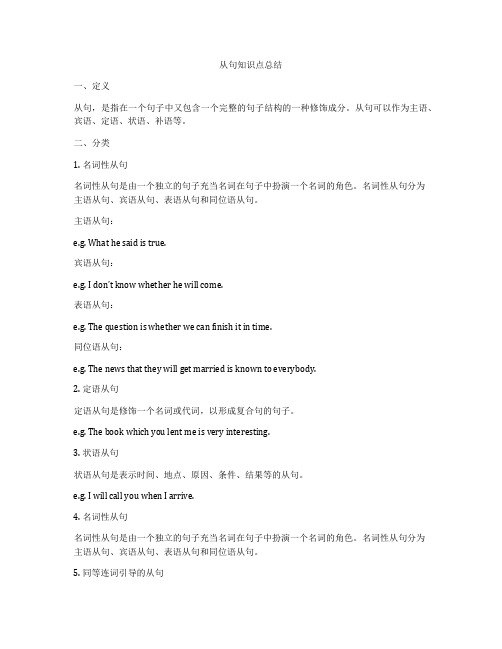
从句知识点总结一、定义从句,是指在一个句子中又包含一个完整的句子结构的一种修饰成分。
从句可以作为主语、宾语、定语、状语、补语等。
二、分类1. 名词性从句名词性从句是由一个独立的句子充当名词在句子中扮演一个名词的角色。
名词性从句分为主语从句、宾语从句、表语从句和同位语从句。
主语从句:e.g. What he said is true.宾语从句:e.g. I don’t know whether he will come.表语从句:e.g. The question is whether we can finish it in time.同位语从句:e.g. The news that they will get married is known to everybody.2. 定语从句定语从句是修饰一个名词或代词,以形成复合句的句子。
e.g. The book which you lent me is very interesting.3. 状语从句状语从句是表示时间、地点、原因、条件、结果等的从句。
e.g. I will call you when I arrive.4. 名词性从句名词性从句是由一个独立的句子充当名词在句子中扮演一个名词的角色。
名词性从句分为主语从句、宾语从句、表语从句和同位语从句。
5. 同等连词引导的从句有时从句可以由“ as, since, while, when, because”等连词引导。
三、从句的语序1. 主语从句的语序如果主语从句是一般疑问句,那么主语从句的语序是正常的一般疑问句语序,即“疑问词 + 谓语 + 主语 + 其他”。
如果主语从句是陈述句,那么主语从句的语序是一般陈述句语序,即“主语+ 谓语+ 其他”。
2. 宾语从句的语序宾语从句的语序根据主句而定。
如果主句是陈述句或肯定句,则宾语从句的语序与原陈述句语序一致;如果主句是疑问句,那么宾语从句的语序是陈述句语序,即“主语 + 谓语 +宾语 + 其他”。
名词性从句知识点总结

名词性从句一.概念名词性从句共有四种:1.主语从句 2.表语从句3.宾语从句 4.同位语从句二.知识点1.主语从句:主语从句在整个句子中作主语。
(1)主语从句中的that不充当句子的成分,只是单纯的连接词,通常不省略。
分句置于句首时,that绝对不可以省略。
That the driver could not control his war was obvious.It was obvious that the driver could not control his car.2.表语从句:表语从句出现在系动词后,充当表语。
The trouble is that we are short of money.Go and get your coat. It’s where you left it.引导表语从句除了上述三类词外还有because, as if/ as though等等The reason (why/for which…..) is that ……It/This/That is because……连系动词“appear, look, seem”的两个常用句型It seems/appears that….It looks/seems as if/as though……(与事实相符用陈述语气,与事实相反用虚拟语气) 3. 宾语从句:(that可以省略)及物动词,形容词和介词后加宾语从句作其宾语。
宾语从句时态与主句相呼应,但宾语从句表示的是客观真理或普遍现象除外The teacher told us (that) the earth moves around the sunI am afraid (that) I have made a mistake.He will have to pay for what he has done.当宾语从句后带宾补时,要用“主语+谓语+it +宾补+that+从句, that不可省略I think it certain that she will do well in her exam.that在宾语从句常可以省略,但由and或 but连接两个或多个宾语从句时,仅可以省略第一个连词thatHe said (that) he had eaten nothing and that he w asn’t hungry.注意区别if引导的宾语从句和条件状语从句I don’t know if he will come. (if是否)If he comes, I’ll let you know. (if 如果)4.同位语从句:(that不可省略)对前面的名词进一步说明。
英语中六大从句用法总结

英语中六大从句用法总结1.主语从句1)主语从句可直接位于主语的位置,如果从句较长,谓语又较短,可用it作形式主语,而将从句放在句末。
常见的句型有:*It is a fact\a pity\a question\good news that...*It seems\appears\happened\has turned out that...*It is clear\important\likely\possible that...*It is said\reported\estimated\has been proved that...It is said that comic books create a connection between people of the same generation.It seems that the performance is very useful.2)what引导的主语从句表示“...的东西时”,一般不用it作形式主语。
What we lack is experience.3)what,who,when,why,whether等词含有各自的疑问意义,但它们引导的主语从句,都用陈述语序。
How the plan is to be carried out should be discussed again.I did know why I felt like crying.2.宾语从句1)宾语从句可位于及物动词、介词和某些形容词后。
连词that常可省略。
介词后一般接疑问词引导的宾语从句。
in that(因为),except that(除了),but that(只是)已构成固定搭配,其他介词后一般不接that引导的宾语从句。
*I promised that I would change the situation.*All this is different from what American young people would say about friendship.*He is certain that watching so much television is not good for children.*This article is well-written except that it is a bit too long.2)宾语从句后如有宾补,要用形式宾语it来代替,而把宾语从句移至宾补之后。
初中从句知识点总结讲解
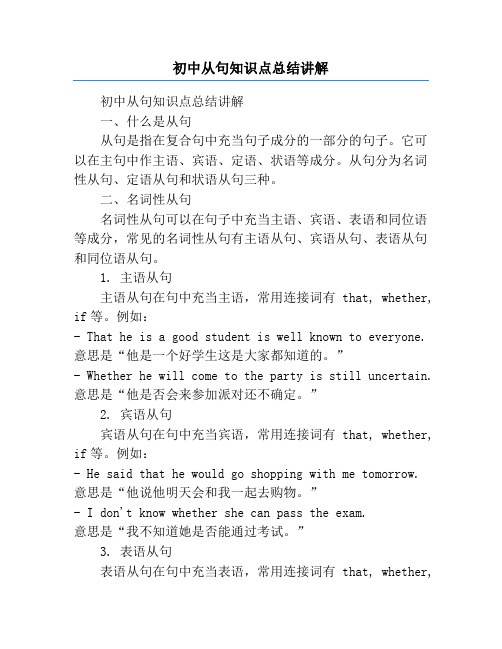
初中从句知识点总结讲解初中从句知识点总结讲解一、什么是从句从句是指在复合句中充当句子成分的一部分的句子。
它可以在主句中作主语、宾语、定语、状语等成分。
从句分为名词性从句、定语从句和状语从句三种。
二、名词性从句名词性从句可以在句子中充当主语、宾语、表语和同位语等成分,常见的名词性从句有主语从句、宾语从句、表语从句和同位语从句。
1. 主语从句主语从句在句中充当主语,常用连接词有that, whether, if等。
例如:- That he is a good student is well known to everyone. 意思是“他是一个好学生这是大家都知道的。
”- Whether he will come to the party is still uncertain. 意思是“他是否会来参加派对还不确定。
”2. 宾语从句宾语从句在句中充当宾语,常用连接词有that, whether, if等。
例如:- He said that he would go shopping with me tomorrow. 意思是“他说他明天会和我一起去购物。
”- I don't know whether she can pass the exam.意思是“我不知道她是否能通过考试。
”3. 表语从句表语从句在句中充当表语,常用连接词有that, whether,if等。
例如:- The fact is that he is a liar.意思是“事实是他是一个说谎者。
”- My concern is whether we can finish the project on time.意思是“我关注的是我们是否能按时完成项目。
”4. 同位语从句同位语从句在句中充当同位语,常用连接词有that, whether, if等。
例如:- The news that he got the first prize made me happy. 意思是“他获得第一名的消息让我很高兴。
初中英语从句总结

初中英语从句总结从句是由一个或多个词组成的句子,在整个句子中充当一个特定的语法角色。
从句可以分为几个不同的类型,如名词从句、形容词从句、副词从句等。
在本次总结中,我将讨论每种从句的定义、特征和例子。
首先,让我们来看看名词从句。
名词从句可以在句子中充当名词的角色。
它可以作为主语、宾语、表语或介词宾语。
通常以从属连词引导,如that、whether、when、where、why等。
例如:1. 主语从句:What she said is true.(她说的是真的。
)2. 宾语从句:I know that she is coming.(我知道她要来。
)3. 表语从句:The fact is that he is lazy.(事实是他很懒。
)4. 介词宾语从句:I am thinking about how I should solve this problem.(我在考虑该如何解决这个问题。
)接下来,我们来看看形容词从句。
形容词从句用于描述或修饰一个名词或代词。
它通常以关系代词或关系副词引导。
例如:1. 关系代词引导的形容词从句:The book that he is reading is very interesting.(他正在读的那本书很有趣。
)2. 关系副词引导的形容词从句:I remember the day when I first met you.(我记得我们第一次见面的那天。
)最后,让我们来讨论副词从句。
副词从句用于在句子中充当副词的角色,用来修饰动词、形容词或副词。
它可以表示时间、地点、原因、条件、目的、方式等。
例如:1. 时间副词从句:I will call you when I finish my homework.(我做完作业后会给你打电话。
)2. 地点副词从句:I will meet you where we first met.(我们第一次见面的地方我会去见你。
)3. 原因副词从句:I am tired because I stayed up late last night.(昨晚我熬夜所以现在很累。
高中从句语法知识点总结
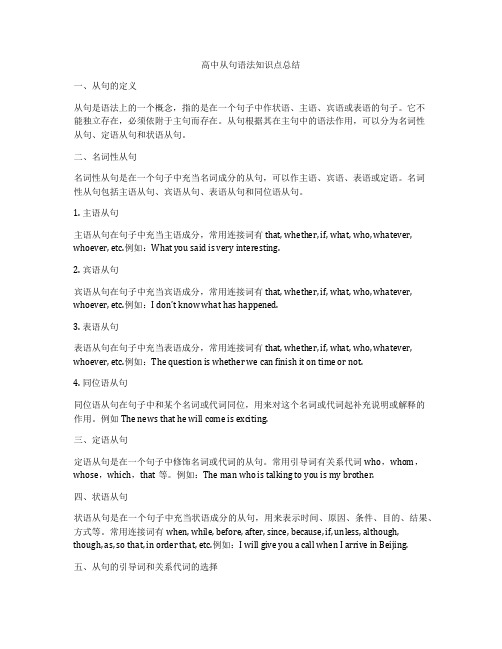
高中从句语法知识点总结一、从句的定义从句是语法上的一个概念,指的是在一个句子中作状语、主语、宾语或表语的句子。
它不能独立存在,必须依附于主句而存在。
从句根据其在主句中的语法作用,可以分为名词性从句、定语从句和状语从句。
二、名词性从句名词性从句是在一个句子中充当名词成分的从句,可以作主语、宾语、表语或定语。
名词性从句包括主语从句、宾语从句、表语从句和同位语从句。
1. 主语从句主语从句在句子中充当主语成分,常用连接词有that, whether, if, what, who, whatever, whoever, etc.例如:What you said is very interesting.2. 宾语从句宾语从句在句子中充当宾语成分,常用连接词有that, whether, if, what, who, whatever, whoever, etc.例如:I don’t know what has happened.3. 表语从句表语从句在句子中充当表语成分,常用连接词有that, whether, if, what, who, whatever, whoever, etc.例如:The question is whether we can finish it on time or not.4. 同位语从句同位语从句在句子中和某个名词或代词同位,用来对这个名词或代词起补充说明或解释的作用。
例如The news that he will come is exciting.三、定语从句定语从句是在一个句子中修饰名词或代词的从句。
常用引导词有关系代词who,whom,whose,which,that等。
例如:The man who is talking to you is my brother.四、状语从句状语从句是在一个句子中充当状语成分的从句,用来表示时间、原因、条件、目的、结果、方式等。
常用连接词有when, while, before, after, since, because, if, unless, although, though, as, so that, in order that, etc.例如:I will give you a call when I arrive in Beijing.五、从句的引导词和关系代词的选择1. 当主句是一般现在时或一般将来时,从句的时态可以随意变换(即使用某一特定时态的从句并不影响主句动词的时态)。
三大从句知识点总结

三大从句知识点总结一、名词性从句名词性从句是在句子中充当名词的作用,可以位于主句中的主语、宾语、表语或者介词宾语的位置,起着名词的作用,因此也被称为从句名词。
名词性从句主要包括宾语从句、主语从句、表语从句和同位语从句等几种。
1. 宾语从句宾语从句用来充当主句中的及物动词(transitive verb)或介词后面的宾语,例如:I know (that) he is coming.(我知道他要来了。
)He said (that) he would come tomorrow.(他说他明天会来。
)在上面的两个例句中,that引导的从句分别充当了know和said后面的宾语。
2. 主语从句主语从句用来作为整个主句的主语,例如:That he is so successful surprises everyone.(他这么成功让每个人都感到惊讶。
)What he is saying is true.(他所说的是真的。
)在上面的两个例句中,从句that he is so successful和what he is saying分别作为整个主句的主语。
3. 表语从句表语从句用来作为及物动词后的表语,例如:The problem is that we don't have enough time.(问题就在于我们没有足够的时间。
)在这个例句中,从句that we don't have enough time充当了动词is后的表语。
4. 同位语从句同位语从句用来解释或者说明名词的内容,例如:The news that he won the prize is exciting.(他获奖的消息令人兴奋。
)在这个例句中,从句that he won the prize充当了news这个名词的同位语。
名词性从句在句子中起着非常重要的作用,能够充分地承担名词的功能,并且丰富了句子的表达方式。
二、定语从句定语从句用来修饰名词或代词,对其进行进一步的说明或者限定,增加句子的信息量。
初中英语知识点归纳常见名词性从句的用法
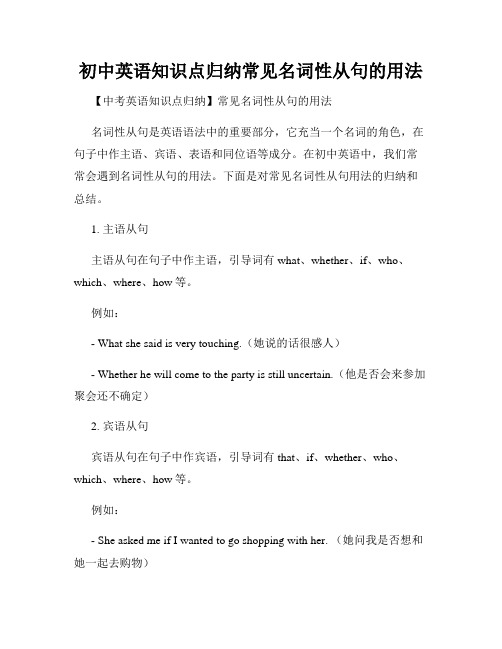
初中英语知识点归纳常见名词性从句的用法【中考英语知识点归纳】常见名词性从句的用法名词性从句是英语语法中的重要部分,它充当一个名词的角色,在句子中作主语、宾语、表语和同位语等成分。
在初中英语中,我们常常会遇到名词性从句的用法。
下面是对常见名词性从句用法的归纳和总结。
1. 主语从句主语从句在句子中作主语,引导词有 what、whether、if、who、which、where、how等。
例如:- What she said is very touching.(她说的话很感人)- Whether he will come to the party is still uncertain.(他是否会来参加聚会还不确定)2. 宾语从句宾语从句在句子中作宾语,引导词有 that、if、whether、who、which、where、how等。
例如:- She asked me if I wanted to go shopping with her. (她问我是否想和她一起去购物)- He doesn't know where he lost his pen.(他不知道他丢了笔的地方)3. 表语从句表语从句在句子中作表语,引导词有 that、whether等。
例如:- The important thing is that we need to be united.(重要的是我们需要团结一致)- The fact is whether we can finish the task on time.(事实是我们是否能按时完成任务)4. 同位语从句同位语从句在句子中解释或说明一个名词,引导词有 that。
例如:- The news that he passed the exam pleased his parents.(他通过考试的消息让他的父母很高兴)- The idea that learning English is important to our future is widely accepted.(英语对我们的未来很重要的观点被广泛接受)5. 定语从句定语从句在句子中修饰一个名词,引导词有 that、who、which、where、whose等。
高中语法从句知识点总结

高中语法从句知识点总结一、名词性从句1. 主语从句:主语从句在句子中充当主语的角色,常用引导词有that, whether/if, what等。
例如:What you said is true.(你说的是真的。
)2. 宾语从句:宾语从句在句子中充当宾语的角色,常用引导词有that, whether/if, what, who, whom, whose, which, when, where等。
例如:I don't know what he wants.(我不知道他想要什么。
)3. 表语从句:表语从句在句子中充当表语的角色,常用引导词有that, whether/if, what等。
例如:The problem is whether we should go or not.(问题是我们是否应该去。
)4. 定语从句:定语从句用来修饰名词或代词,常用引导词有that, which, who, whom, whose等。
例如:The book that I borrowed from the library is very interesting.(我从图书馆借的那本书很有趣。
)二、状语从句1. 时间状语从句:时间状语从句用来表示动作发生的时间,常用引导词有when, while, as, before, after, since, until, as soon as等。
例如:I will call you as soon as I arrive.(我一到就给你打电话。
)2. 地点状语从句:地点状语从句用来表示动作发生的地点,常用引导词有where, wherever等。
例如:I will go wherever you go.(无论你去哪里,我都会跟着去。
)3. 原因状语从句:原因状语从句用来表示动作的原因,常用引导词有because, since, as, now that等。
例如:She didn't come because she was sick.(她没来是因为她生病了。
英语八大从句类型总结

英语八大从句类型总结主句和从句的划分方法是相同的。
句子的成分从谓语动词处来划分比较容易。
今天我们就一起来看看英语八大从句类型总结吧!英语八大从句类型总结从句是相对于主句而言的,即它是从属于某一个主句,而不能单独作一个句子。
在英语中,主要有三大从句,即名词性从句(包括主语从句,宾语从句,表语从句,同位语从句)、形容词性从句(即定语从句)、副词性从句(即状语从句,包括时间、条件、结果、目从句是相对于主句而言的,即它是从属于某一个主句,而不能单独作一个句子。
在英语中,主要有三大从句,即名词性从句(包括主语从句,宾语从句,表语从句,同位语从句)、形容词性从句(即定语从句)、副词性从句(即状语从句,包括时间、条件、结果、目的、原因、让步、地点、方式等)。
主语从句用作主语,如::That the earth is round is true.地球为圆的是真实的。
宾语从句用作宾语。
如:Do you know where he lives?表语从句用作表语,如:XXX is that you should not go alone.我的意见是你不应单独前往。
同位语从句用于解释说明前面的名词。
如:The fact that the earth is round is true.地球是圆的的究竟是实在的。
(that从句用于解释申明the fact)定语从句相当于一个形容词,用于修饰前面的名词。
如:XXX XXX XXX.回覆下列问题的学生是XXX.状语从句相当于一个副词,如:When it rains,I usually go to school by bus.天下雨时,我通常坐大众汽车上学。
(工夫状语)If XXX,you will see him.假如他明天来,你就可以瞥见他。
(if引导的前提状语从句,其结构为:if +状语从句,+主句)。
要留意在状语从句中有一个规则是“主将从现”,即主句是未来时,则从句要用普通目前时表示未来。
从句的类型及引导词总结
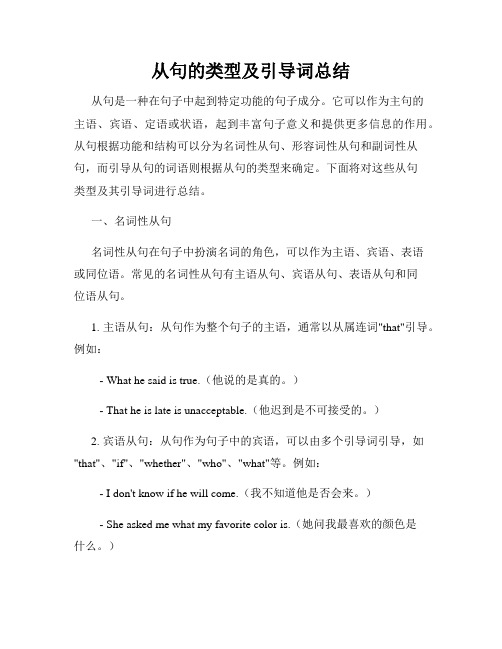
从句的类型及引导词总结从句是一种在句子中起到特定功能的句子成分。
它可以作为主句的主语、宾语、定语或状语,起到丰富句子意义和提供更多信息的作用。
从句根据功能和结构可以分为名词性从句、形容词性从句和副词性从句,而引导从句的词语则根据从句的类型来确定。
下面将对这些从句类型及其引导词进行总结。
一、名词性从句名词性从句在句子中扮演名词的角色,可以作为主语、宾语、表语或同位语。
常见的名词性从句有主语从句、宾语从句、表语从句和同位语从句。
1. 主语从句:从句作为整个句子的主语,通常以从属连词"that"引导。
例如:- What he said is true.(他说的是真的。
)- That he is late is unacceptable.(他迟到是不可接受的。
)2. 宾语从句:从句作为句子中的宾语,可以由多个引导词引导,如"that"、"if"、"whether"、"who"、"what"等。
例如:- I don't know if he will come.(我不知道他是否会来。
)- She asked me what my favorite color is.(她问我最喜欢的颜色是什么。
)3. 表语从句:从句作为句子中的表语,通常以从属连词"that"引导。
例如:- The fact is that he lied to us.(事实是他对我们撒了谎。
)- My dream is that I can travel around the world.(我的梦想是能环游世界。
)4. 同位语从句:从句作为另一个名词或代词的同位语,通常以从属连词"that"或连接代词/连接副词引导。
例如:- The news that she won the first prize was exciting.(她赢得一等奖的消息令人激动。
英语八大从句类型总结

英语八大从句类型总结总结:从句是构成复合句的一部分,也是英语语法中非常重要的部分。
根据从句的用途和功能,可以将从句分为八大类型,分别是名词性从句、形容词性从句、副词性从句、定语从句、宾语从句、主语从句、表语从句和同位语从句。
每种从句都具有自己的特点和用法,下面将逐一介绍。
1. 名词性从句(Noun Clauses):名词性从句可作主语、宾语、表语和同位语等。
其引导词有that, whether, if, what, who, whom, which, whoever, whatever, whenever, wherever等。
名词性从句在句子中起到名词的作用,可代替一个名词短语或单个名词。
例句:- I don't know what he is doing.(主语从句)- Can you tell me where the library is?(宾语从句)- His question is whether we can finish the project on time.(表语从句)2. 形容词性从句(Adjective Clauses):形容词性从句用来修饰名词或代词,通常位于其所修饰的名词或代词之后。
其引导词有that, who, whom, which等。
例句:- The book that you lent me is very interesting.(修饰名词book)- I know a girl who can play the piano very well.(修饰名词girl)3. 副词性从句(Adverb Clauses):副词性从句用来修饰动词、形容词或副词,通常位于句子中的谓语动词之后。
根据从句的用途和功能,副词性从句可以分为条件状语从句、时间状语从句、地点状语从句、方式状语从句、目的状语从句、结果状语从句和比较状语从句等。
例句:- If it rains tomorrow, we won't go to the park.(条件状语从句)- He has lived in New York since he moved there ten years ago.(时间状语从句)- She looked for her keys everywhere she could think of.(地点状语从句)4. 定语从句(Relative Clauses):定语从句用来修饰名词或代词,通常位于其所修饰的名词或代词之后。
从句总结归纳
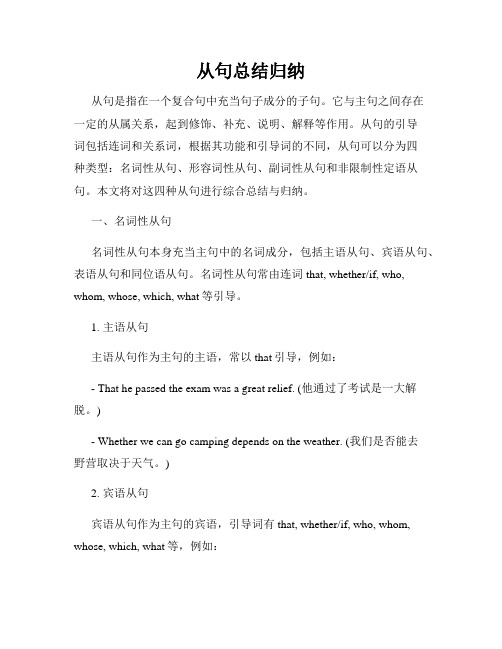
从句总结归纳从句是指在一个复合句中充当句子成分的子句。
它与主句之间存在一定的从属关系,起到修饰、补充、说明、解释等作用。
从句的引导词包括连词和关系词,根据其功能和引导词的不同,从句可以分为四种类型:名词性从句、形容词性从句、副词性从句和非限制性定语从句。
本文将对这四种从句进行综合总结与归纳。
一、名词性从句名词性从句本身充当主句中的名词成分,包括主语从句、宾语从句、表语从句和同位语从句。
名词性从句常由连词that, whether/if, who, whom, whose, which, what等引导。
1. 主语从句主语从句作为主句的主语,常以that引导,例如:- That he passed the exam was a great relief. (他通过了考试是一大解脱。
)- Whether we can go camping depends on the weather. (我们是否能去野营取决于天气。
)2. 宾语从句宾语从句作为主句的宾语,引导词有that, whether/if, who, whom, whose, which, what等,例如:- He asked me if I could lend him some money. (他问我是否能借他一些钱。
)- I don't know what he is talking about. (我不知道他在说什么。
)3. 表语从句表语从句作为主句的表语,通常以that引导,例如:- The important thing is that you have tried your best. (重要的是你已经尽力了。
)- The fact is that he is always late for work. (事实上他上班总是迟到。
)4. 同位语从句同位语从句用来对主句中的名词进行解释或补充说明,通常以that 引导,例如:- The news that he won the first prize made us excited. (他获得一等奖的消息让我们激动起来。
- 1、下载文档前请自行甄别文档内容的完整性,平台不提供额外的编辑、内容补充、找答案等附加服务。
- 2、"仅部分预览"的文档,不可在线预览部分如存在完整性等问题,可反馈申请退款(可完整预览的文档不适用该条件!)。
- 3、如文档侵犯您的权益,请联系客服反馈,我们会尽快为您处理(人工客服工作时间:9:00-18:30)。
(1)表语从句
1.定义:用作表语的从句叫做表语从句。
2.构成:关联词+简单句
3.引导表语从句的关联词的种类:
(1) 从属连词that。
如:
The trouble is that I have lost his address. 麻烦是我把他的地址丢了。
(2) 从属连词whether, as, as if。
如:
He looked just as he had looked ten years before. 他看起来还与十年前一样。
The question is whether they will be able to help us. 问题是他们是否能帮我们。
注:从属连词if一般不用来引导表语从句,但as if却可引导表语从句,如:
All this was over twenty years ago, but it's as if it was only yesterday.
这都是20多年前的事了,但宛如昨天一样。
能跟表语从句的谓语动词一般为系动词be, seem, look等。
如:
It looked as if it was going to rain. 看起来天要下雨了。
(3)连接代词who, whom, whose, what, which, whoever, whatever, whichever
连接副词where, when, how, why。
如:The problem is who we can get to replace her. 问题是我们能找到谁去替换她呢。
The question is how he did it. 问题是他是如何做此事的。
That was what she did this morning on reaching the attic. 那就是她今晨上了阁楼干的。
解释:
1.连词because可引导表语从句。
如:
I think it is because you are doing too much. 我想这是因为你做得太多。
2.在一些表示“建议、劝说、命令”的名词后面的表语从句中,谓语动词用虚拟语气。
should+动词原形表示,should可省略。
如:
My suggestion is that we (should) start early tomorrow. 我的建议是我们明天一早就出发。
(2)主语从句
1.定义:用作主语的从句叫做主语从句。
2.构成:关联词+简单句
3.引导主语从句的关联词有三类:
(1) 从属连词that。
如:That they were in truth sisters was clear from the facial resemblance between them.
很明显,她们确是亲姐妹,她们的脸型很相似。
(2) 从属连词whether。
如:
Whether he’ll come here isn’t clear. 他是否会来这里还不清楚。
(3) 连接代词who, whom, whose, what, which, whoever, whatever, whichever
连接副词where, when, how, why。
如:
What she did is not yet known. 她干了什么尚不清楚。
How this happened is not clear to anyone. 这事怎样发生的,谁也不清楚。
Whoever comes is welcome. 不论谁来都欢迎。
Wherever you are is my home ---- my only home. 你所在的任何地方就是我的家----我唯一的家。
解释:
1.主语从句能用it作形式上的主语。
常以it作形式主语的句型有:A. It+be+形容词(obvious, true, natural, surprising, good, wonderful, funny, possible, likely, certain, probable, etc.)+that从句。
如:
It is certain that she will do well in her exam. 毫无疑问她考试成绩会很好。
It is probable that he told her everything. 很可能他把一切都告诉她了。
B. It+be+名词词组(no wonder, an honour, a good thing, a pity, no surprise, etc.)+that从句。
如:
It’s a pity that we can’t go. 很遗憾我们不能去。
It’s no surprise that our team should have won the game. 我们没赢这场比赛真意外。
C. It+be+过去分词(said, reported, thought, expected, decided, announced, arranged, etc.)+that从句。
如:
It is said that Mr. Green has arrived in Beijing. 据说格林先生已经到了北京。
It is reported that China has sent another man-made earth satellite into orbit.
据报道中国又成功地发射了一颗人造地球卫星。
D. It+seem, happen等不及物动词及短语+that从句。
如:
It seems that Alice is not coming to the party at all. Alice似乎不来参加晚会。
It happened that I was out that day. 碰巧我那天外出了。
E. It+doesn’t matter (makes no difference, etc.)+连接代词或连接副词引起的主语从句。
如:
It doesn’t matter whether she will come or not. 她是否来这无关紧要。
It makes no difference where we shall have the meeting. 我们在哪里开会毫无区别。
F. 当that引导的主语从句出现在疑问句中时,要以it作形式主语,而把主语从句后置。
如:
Is it true that the scientist will give us a lecture next week? 下周那位科学家将给我们作报告是真的吗?
Does it matter much that they will not come tomorrow? 他们明天不
来很要紧吗?
G. 当主语从句出现在感叹句中时,要以it作形式主语,而把主语从句后置。
如:
How strange it is that the children are so quiet! 孩子们这么安静真奇怪!
2.注意连接代词whoever, whatever, whichever等引导主语从句的含义
Whoever comes will be welcome. (whoever=the person who) 来的人将受到欢迎。
Whatever he did was right. (whatever=the thing that) 他所做的事情是正确的。
Whichever of you comes in will receive a prize. (whichever=anyone of you who) 你们当中不论哪个进来将会得到奖。
